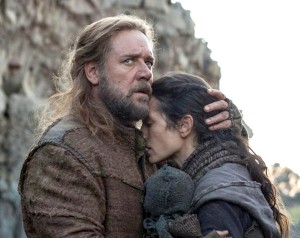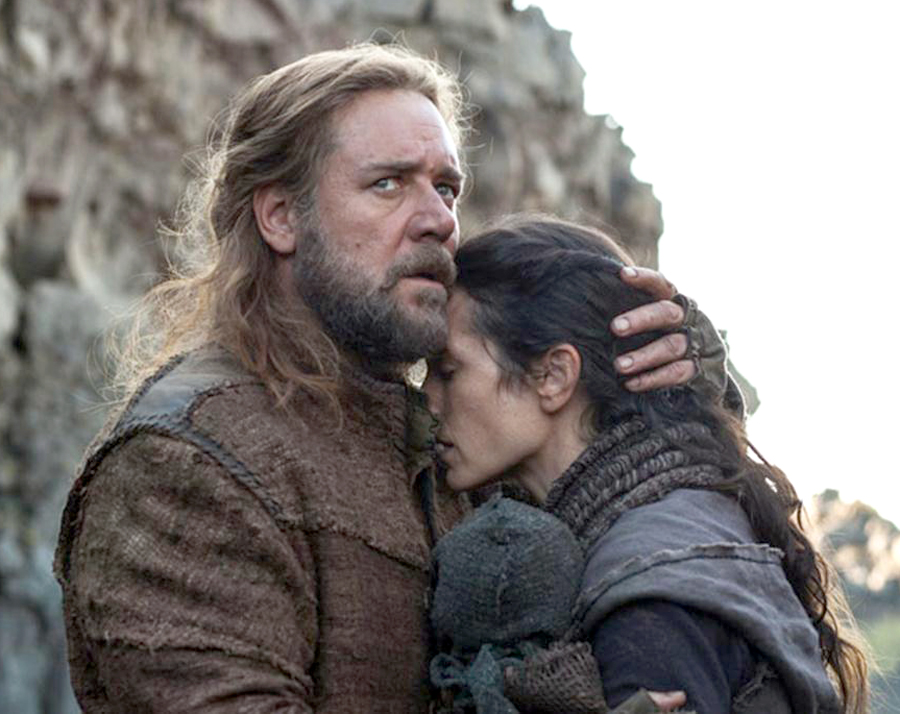Religious films begin to flood the market
It’s been a decade since Mel Gibson’s bloody, polarizing The Passion of the Christ became an unlikely box office phenomenon, grossing more than $600 million worldwide and igniting a holy firestorm of controversy and theological debate, and Hollywood is still trying to replicate its success, especially its ability to appeal directly to Christian viewers.

Perfect storm · Noah, played by Russell Crowe, and his family struggle to survive an apocalyptic deluge — and each other — in director Darren Aronofsky’s new, bold biblical epic Noah, due on Friday. – Photo courtesy of Fox News
In their zeal to capture the hearts and wallets of the faithful, studios such as 20th Century Fox and Paramount seem poised to unleash a second coming of grand-scale religious filmmaking, the kind not seen since the 1950s heyday of Cecil B. DeMille’s The Ten Commandments and William Wyler’s version of Ben-Hur. 2014’s release calendar is already stacked to the rafters with biblical adaptations and other devout epics, many of them commanding the Goliath-sized budgets typically reserved for the latest superhero sequel.
February saw the release of Son of God, a bland, listless dramatization of the life, death and resurrection of Jesus Christ that cobbled together new and used footage from the History Channel’s The Bible. The channel’s hit miniseries, which averaged a staggering 11.4 million viewers during its five-week run last March, received well-founded criticism for featuring a Satan who bore more than a passing resemblance to President Barack Obama.
Despite poor reviews — the film currently holds a 22 percent score on Rotten Tomatoes — Son of God did well in theaters, debuting just behind Liam Neeson’s hijacking thriller Non-Stop and eventually earning a respectable $55 million. Like The Passion of the Christ, the film received the blessing of conservative leaders — including evangelical pastor Rick Warren — and was marketed specifically to churches and other Christian organizations in an effort to promote the film as separate from other Hollywood offerings (never mind that it was distributed by 20th Century Fox).
Director Ridley Scott, who previously examined the physical and spiritual toll of the Crusades in the supremely underrated Kingdom of Heaven, is currently hard at work putting the finishing touches on Exodus, a retelling of the liberation of the Israelites starring Breaking Bad’s Aaron Paul, Joel Edgerton and Academy Award winner Christian Bale as Moses. The film, scheduled for release this December, hopes to attract both Christian and Jewish audiences, emphasizing commonalities between the two faiths and presenting the story as a timeless parable of courage and sacrifice.
In terms of narrative scope, technical ambition and sheer audacity, however, no other film in 2014’s religious roster represents a riskier bet than Darren Aronofsky’s Noah, which has already been banned in three predominantly Muslim countries, and is expected to be banned in three more that don’t allow the portrayal of prophets. Aronofsky, the director of The Wrestler and Requiem for a Dream, is one of the most original and uncompromising voices in an industry increasingly beset by meddling studio executives and by-committee screenplays. The critical and commercial success of his 2010 psychosexual ballerina thriller Black Swan prompted Paramount to green-light the filmmaker’s first prospective blockbuster: a tale of human clemency, divine justice and survivor’s guilt very loosely inspired by one of the most well-known stories in the Old Testament.
Despite being an avowed atheist, Aronofsky has long been fascinated with the character of Noah as a tormented prophet who must abandon the rest of humanity, not to mention the inherently unsettling idea of God giving his creation a hard reboot in the form of a genocidal, world-drowning flood. In order to find financial backing for the project, Aronofsky and his co-screenwriter Ari Handel collaborated with Canadian artist Niko Henrichon to create a graphic novel based on their script. The first volume of the work, titled Noah: For the Cruelty of Men, was released in October 2011. Soon after its publication, Paramount gave the go-ahead for the big screen version, including its eyebrow-raising $130 million budget.
Aronofsky approached Christian Bale and Michael Fassbender about playing the title role before finally settling on Crowe, whose gruff regality seems like an ideal fit for this darker, morally burdened version of Noah. The rest of the cast is equally impressive, especially Jennifer Connelly as Noah’s wife Naameh, Perks of Being a Wallflower co-stars Logan Lerman and Emma Watson as his son Ham and daughter-in-law Ila, respectively, and the always-welcome Cockney character actor Ray Winstone as Tubal-cain, the boastful king of men who goes from scoffing at Noah’s warnings to raising an army to take the ark by force after the storm begins. The gravel-throated Nick Nolte also appears as a fallen angel named Samyaza, the leader of a group called the Watchers that represents the extensive creative license Aronofsky is rumored to have taken with the story.
Relations between Aronofsky and Paramount are reportedly strained after a series of post-production shenanigans involving the studio’s fixation with courting Christian viewers. After early test screenings with religious audiences produced feedback that was decidedly less than rapturous, Paramount re-edited the film into several alternate cuts without Aronofsky’s knowledge or consent. When the director found out, he was understandably furious. According to the studio, however, the version of Noah we’re getting in theaters is Aronofsky’s final cut.
Some viewers are bound to take offense at adaptations that take liberties with holy source material, but the idea of talented filmmakers such as Aronofsky and Scott putting their authorial stamps on some of the most durable stories ever told is too exciting to be left at the humorless mercy of biblical literalists. In fact, this might be a case where not going by the book is the best course of action. To borrow a phrase from J.R.R. Tolkien, the stories that endure the longest are those that grow in the telling.
Landon McDonald is a graduate student studying public relations. His column, “The Reel Deal,” runs Thursdays.

